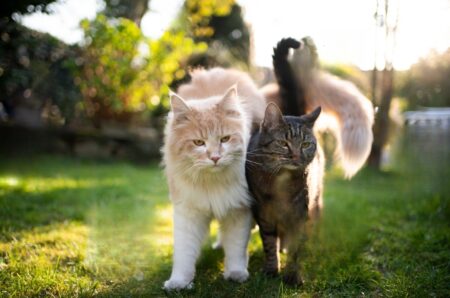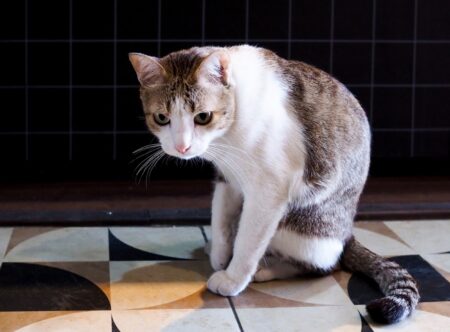Can Cats Be Vegan?
The debate over whether cats can be vegan is a contentious one in the pet-owning community. On one hand, there are those who argue that cats are obligate carnivores and require meat in their diets in order to thrive. On the other hand, there are those who believe that a plant-based diet can provide all of the necessary nutrients for a cat’s well-being. In this article, we will explore the arguments on both sides and examine the potential pros and cons of a vegan diet for cats.
What is an obligate carnivore?
An obligate carnivore is an animal that must consume meat in order to survive. This term is often used to describe cats because they have specific dietary needs that can only be met through the consumption of animal protein.
Why are cats considered obligate carnivores?
Cats have evolved as hunters and their bodies are specifically adapted to digest animal protein. They need certain amino acids, such as taurine and arginine, that can only be found in animal sources. These amino acids are essential for their overall health and cannot be produced in the body. Cats also have a shorter digestive tract than other animals, making it difficult for them to digest plant-based foods.
What are the potential benefits of a vegan diet for cats?
Some advocates of a vegan diet for cats believe that it can provide numerous benefits for their health. One of the main arguments is that a plant-based diet can help prevent or alleviate certain health issues that are associated with a meat-based diet. These include obesity, diabetes, and allergies which are all common health concerns in cats.
A plant-based diet can also be a more environmentally friendly option as it reduces the demand for meat production and the associated resources such as land and water.
Can Cats Be Vegan?
No, it is not recommended for cats to follow a vegan diet. Unlike dogs, who can thrive on a vegan diet with proper supplementation, cats are obligate carnivores, meaning they need meat in their diet in order to obtain essential nutrients such as taurine, arginine, and arachidonic acid. These nutrients are crucial for a cat’s overall health, and their bodies are not able to produce them on their own. Without enough of these nutrients, cats can develop serious health issues such as heart disease, blindness, and paralysis.
Additionally, cats have a low ability to digest plant-based proteins and require a high-protein diet to support their natural diet as carnivores. A vegan diet may not provide enough protein for a cat’s needs and can lead to muscle wasting and weakness.
It is important to consult with a veterinarian before making any changes to your cat’s diet. They can assess your cat’s individual needs and make recommendations for a balanced and nutritious diet. If you are concerned about the ethics of feeding your cat meat, consider choosing a high-quality, humanely-sourced, and sustainable brand of cat food.
Vegan Cat Life Expectancy
Vegan cats can have a similar life expectancy as non-vegan cats, as long as their nutritional needs are adequately met. A cat’s diet must contain essential nutrients, such as taurine, which is typically found in meat sources. However, vegan cat food brands do exist that are fortified with taurine and other essential nutrients for cats. If a vegan cat’s diet is properly balanced and meets all their nutritional needs, they can have a normal life expectancy of around 15-20 years. It is important to consult with a veterinarian before switching a cat to a vegan diet to ensure that their nutritional needs are being met.
SEE ALSO: How to Get Your Dog Started in Flyball: Step-by-Step
Why Do Cats Need Meat?
Cats need meat in their diet because they are obligate carnivores, meaning they require meat to survive and thrive. Their bodies are designed to process and obtain essential nutrients from animal protein, such as taurine, which is critical for their heart and eye health. They also require amino acids like arginine and essential fatty acids like arachidonic acid, which are found in high concentrations in animal meat. Without these nutrients, cats can develop serious health issues, such as heart disease, anemia, and vision problems. In addition, cats have a lower ability to digest carbohydrates, making meat a more efficient and necessary source of energy for them. Overall, meat is essential for maintaining a cat’s overall health and well-being.
The Nutrients Vegan Cats Need
It’s a common belief that cats have to eat meat to be healthy, but this is not entirely true. In fact, cats can get all the nutrients they need from a well-planned vegan diet. Here are the key nutrients that a vegan cat diet should include:
- Protein: Protein is a crucial nutrient for cats, as it is necessary for maintaining muscle mass and supporting a healthy immune system. While meat is a rich source of protein, there are also plant-based sources that can provide cats with all the essential amino acids they need. Some plant-based sources of protein for cats include soy, peas, beans, and lentils.
- Taurine: Taurine is an essential amino acid that is important for cats’ heart health, digestive function, and vision. Most commercial cat foods are supplemented with taurine, so it’s important to make sure any vegan cat food you choose includes adequate levels of this nutrient. Plant-based sources of taurine include brewer’s yeast and seaweed.
- Fatty Acids: Omega-3 and omega-6 fatty acids are important for maintaining healthy skin and coat, as well as supporting immune function in cats. These fatty acids are typically found in animal-based sources such as fish, but they can also be obtained from plant-based sources such as flaxseed, chia seeds, and canola oil.
- Vitamins and Minerals: Cats also need a range of vitamins and minerals in their diet to support overall health. Some key nutrients to look for in vegan cat food include vitamin D, vitamin B12, and calcium. These nutrients can be obtained from fortified plant-based foods such as yeast, soy milk, and leafy greens.
Commercial Vegan Diets for Cats
- Evolution Diet Vegan Cat Food: This commercially available cat food is 100% plant-based and formulated to meet the nutritional needs of cats without any meat, dairy, or eggs.
- Wild Earth Vegan High-Protein Cat Food: This dry cat food is made with plant-based ingredients like yeast, oats, and peas to provide a complete and balanced diet for cats.
- V-Dog Vegan Kibble for Cats: This kibble is made with plant-based ingredients and fortified with essential nutrients to support the unique dietary needs of cats.
- Ami Vegan Cat Food: Made in Italy, this cat food is organic and vegan, with a formula designed to mimic the natural diet of cats.
- Benevo Vegan Cat Food: This dry cat food is made with a blend of plant-based proteins, including wheat, corn, and soy, to provide cats with all the necessary nutrients for optimal health.
- Halo Vegan Natural Cat Food: This wet cat food is made with chickpeas, lentils, and peas as the main sources of protein, along with added vitamins, minerals, and antioxidants.
- Nature’s Variety Instinct Limited Ingredient Diet Grain-Free Recipe: This grain-free option is made with plant-based proteins like peas and chickpeas and designed for cats with allergies or sensitivities to meat.
- Natural Balance Vegetarian Dry Cat Food: This vegetarian formula is made with brown rice, oatmeal, and potatoes as the main sources of carbohydrates, along with added vitamins and minerals.
- Royal Canin Vegetarian Formula Cat Food: This specialized formula is designed for cats with food sensitivities, with a blend of plant-based proteins and fiber for digestive support.
- Earthborn Holistic Primitive Feline Grain-Free Natural Cat Food: This grain-free, plant-based cat food is made with pea proteins and essential amino acids to support healthy muscle growth and overall cat health.
What Are the Risks of Feeding Your Cat Vegan Food?
Feeding your cat a vegan diet can pose several risks to their health including:
- Nutrient Deficiencies: Cats are obligate carnivores, meaning they require nutrients found only in animal products to survive. A vegan diet lacks essential nutrients such as taurine, arachidonic acid, and vitamin B12, which are crucial for a cat’s health and cannot be obtained from plant sources. A deficiency in these nutrients can lead to serious health problems like heart disease, blindness, and nerve damage.
- Digestive Issues: A cat’s digestive system is designed to process and absorb nutrients from meat-based diets. Plant-based diets can be difficult for cats to digest and can lead to diarrhea, vomiting, and other gastrointestinal issues.
- Weight Loss: Cats need a high-protein diet to maintain their muscle mass and energy levels. Vegan diets are typically lower in protein and may not provide enough calories for a cat to maintain a healthy weight, leading to muscle wasting and weakness.
- Urinary Tract Problems: Cats need a proper balance of minerals, particularly magnesium and phosphorus, to maintain a healthy urinary tract. A vegan diet may not provide the right balance of these minerals, increasing the risk of bladder and kidney stones.
- Allergic Reactions: Cats can be allergic to plant-based foods just like humans can be allergic to certain foods. Introducing a new diet without proper testing and supervision can lead to allergic reactions and cause discomfort for your cat.
- Behavioral Changes: Cats may not enjoy the taste or texture of vegan food, leading to behavioral changes such as refusal to eat, depression, or aggression.
- Long-Term Health Issues: A vegan diet may not meet all of a cat’s nutritional needs, which can lead to long-term health issues and a shortened lifespan.
SEE ALSO: Rabies in Cats: Signs To Look For
FAQs
Q. Can a cat survive a vegan diet?
A. It is possible for a cat to survive on a vegan diet, but it is not recommended. Cats are obligate carnivores, meaning they require nutrients found only in animal proteins to survive and thrive.
Q. Do cats need meat to survive?
A. Yes, cats are obligate carnivores and require meat in their diet to survive.
Q. How long do vegan cats live?
A. The life span of a vegan cat can vary depending on individual factors such as genetics, overall health, and living conditions. In general, vegan cats can live just as long as non-vegan cats if their nutritional needs are properly met and they receive appropriate veterinary care. This can be anywhere from 10-20 years, with some cats living even longer.
Q. Is it safe for pets to be vegan?
A. It is a controversial topic and there is no clear answer. Some people believe that a properly planned vegan diet can be safe for pets, while others argue that it goes against their natural diet and can cause health problems. It is important for pet owners to consult with a veterinarian before making any major dietary changes for their pets.
Conclusion
While some argue that cats can thrive on a vegan diet, it is not recommended by most veterinarians and animal nutritionists. Cats are obligate carnivores and require taurine, an essential amino acid found only in animal products, for their overall health and well-being. A vegan diet may not provide all the necessary nutrients and can potentially lead to health issues in cats, such as malnutrition, gastrointestinal problems, and heart disease. It is important for cat owners to provide their pets with a diet that meets their natural dietary needs and ensures proper nutrition. Therefore, cats should not be put on a vegan diet and should instead be fed well-balanced, species-appropriate diets that include animal-based proteins and other essential nutrients.

